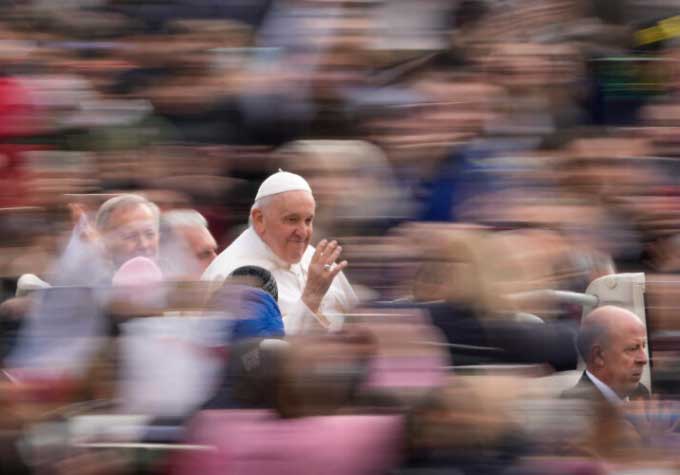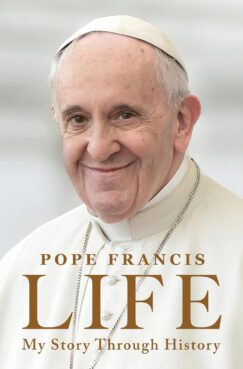VATICAN CITY (RNS) — In a new memoir, Pope Francis tells his story through the historical moments that punctuated his life, from the Second World War to Sept. 11, and examines how those events ultimately impacted his pontificate.
The book, titled “Life: My Story Through History,” is being published by Harper Collins in Europe and in the United States on March 19, marking the 11th anniversary of Pope Francis’ tenure as head of the Catholic Church.
While the pope has published autobiographies before, this memoir, based on the pope’s conversations with Vatican journalist Fabio Marchese Ragona, illustrates the profound influence world events have had on Francis. From the horrors of the Holocaust to the dropping of the atomic bomb, from the injustices of McCarthyism to the fall of the Berlin Wall, historical events shaped the life of Jorge Mario Bergoglio, forging his priorities as a religious leader.
RELATED: Pope Francis Tells Ukraine That There Is ‘No Shame in Negotiating’
As the 87-year-old pope looks back on his life in the book, he also addresses his ailing health and old age. “I have never had reason to think about resigning, because that is an option to be considered, from my point of view, only in the case of serious health problems,” he said in the book.
“Life: My Story Through History” by Pope Francis. (Image courtesy HarperCollins)
Francis, who was elected in 2013 after his predecessor Benedict XVI made the historic decision to step down and take the title of Emeritus pope, visited the hospital in February for influenza and has struggled to stand or read publicly in recent weeks. In the memoir he states that if his health were to seriously decline he would take the role of bishop emeritus of Rome and offer confessions at the church of St. Mary Major in Rome.
“Some people may have hoped that sooner or later, perhaps after a stay in the hospital, I might make an announcement of that kind, but there is no risk of it: thanks be to God, I enjoy good health, and as I have said, there are many projects to bring to fruition, God willing,” he added.
“As far as my service is concerned, there is no shortage of plans. There are still so many things to do,” the pope told Ragona, discussing plans to visit his native Argentina, his continued commitment to the cause of migrants and refugees, his advocacy for the environment and the long road toward true ecumenism.
Central to this role is Pope Francis’ brainchild: the Synod on Synodality, a yearslong consultation of Catholics at every level of the church on how to engage with the modern world. “Even though there are those within the church, consumed by pride and egotism and prey to diabolical temptations, who would like to see it divided as if there were two groups of rival fans,” he added.
The 30-year period in Argentina known as the Dirty War (1974-1983) tested Francis’ ability to navigate complex political situations and an authoritarian rule. Through that time, he says in the memoir, he learned how to handle criticism and attempts to smear his reputation.
“There are always some who wish to put the brakes on reform, who want things always to stay as they were during the days of pope kings, who dream of superficial change that preserves the status quo, and this is certainly not good for the Church,” Francis added.
A recently published letter, signed Demos II and allegedly written by a cardinal, accused the pope of being “autocratic” and “vindictive” and laid out prerequisites for his successor. The pope’s openness toward marginalized groups, including LGBTQ faithful and women, have also led to backlash by Catholic conservatives.
On Fiducia Supplicans, a document issued by the Vatican’s Doctrinal department allowing the blessing of couples in irregular situations including same-sex couples, the pope told Ragona: “I just want to say that God loves everyone, especially sinners.”
Transexuals and homosexuals, the pope added, “must be welcomed with open arms.” But this does not challenge the church’s doctrinal belief that marriage can only be between a man and a woman. “Civil unions are another matter,” he clarified. “It is right that these people who experience the gift of love should have the same legal protections as everyone else.”


